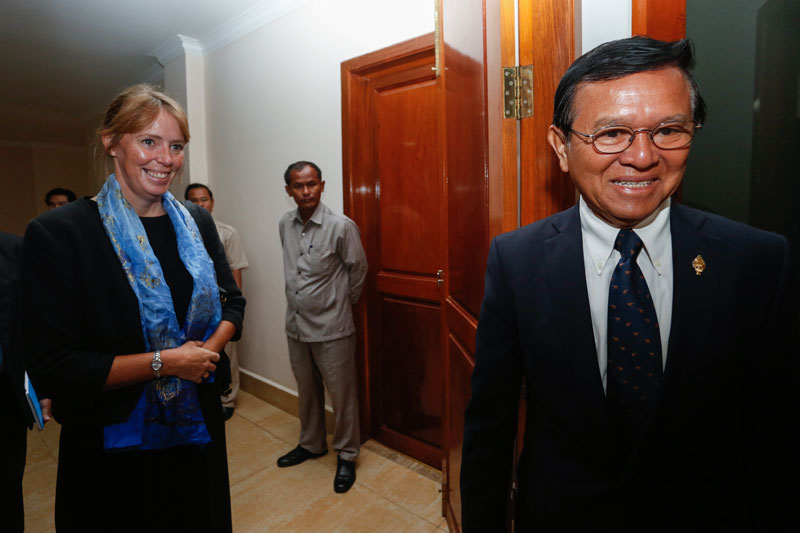CNRP Vice President Kem Sokha on Wednesday met with Rhona Smith, the U.N.’s new special rapporteur on human rights in Cambodia, telling the envoy that the country’s judiciary needed to be reformed before human rights could be properly protected.
Ms. Smith is on her first visit to Cambodia since she was approved as the latest U.N. rights envoy to the country in March. She will report to the 30th session of the U.N. Human Rights Council later this month on the human rights situation.

“I did not raise any specific issues because the world already knows about these,” Mr. Sokha told reporters following the meeting. “If there were no problems here, she would not have been sent.”
Mr. Sokha said he told Ms. Smith that Cambodia’s human rights problems would be intractable unless reforms were made in the country’s oft-criticized court system.
“There must be court system reform first, and if we do not have real reform to make the court system independent, then human rights issues in Cambodia cannot be solved,” he said.
Olga Nakajo, assistant to the special rapporteur, said in an email that Ms. Smith had agreed with the deputy opposition leader that Cambodia’s court system needed strengthening.
“The Special Rapporteur agreed on the need for further reform of the judiciary with a view to strengthening its independence,” Ms. Nakajo said.
In addition to Wednesday’s talk with Mr. Sokha, Ms. Smith—whose visit concludes today—also held meetings with Deputy Prime Minister Sok An, Interior Minister Sar Kheng and Rural Development Minister Chea Sophara.
Phath Sophanith, a cabinet official at the Interior Ministry, said that in the meeting between Mr. Kheng and Ms. Smith at the ministry, they discussed a draft law on cybercrime, which was described by a government official last year as “not a priority.”
However, Mr. Sophanith said that the interior minister called the law “very important.”
Ms. Smith said in an email that while “ensuring appropriate regulation” of the Internet was a challenge, basic rights needed to be considered.
“It is important that any such law guarantees freedom of expression as stipulated in international human rights law,” she said.
(Additional reporting by Anthony Jensen)



